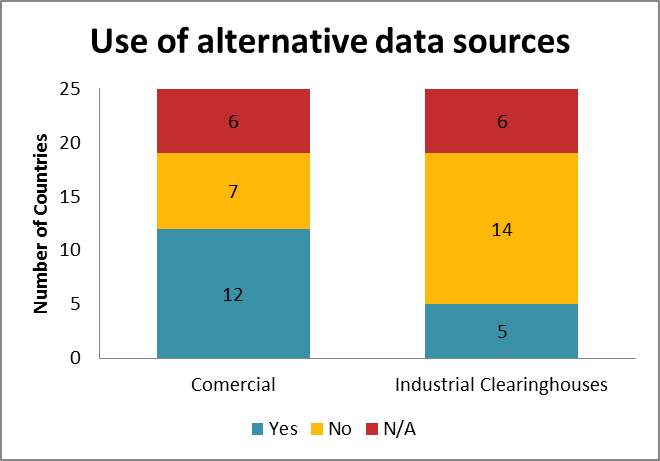Prior to the 2012 seminar, participants were asked to complete an online questionnaire about the organization and practices relating to data collection in their institutions. Below is a summary of the major findings.
Please note that the survey was designed to provide an overview rather than scientific measurements. Only organizations represented at the seminar were invired to take part; some participants were unable to give accurate answers; and many questions were worded in such a way as to elicit approximate rather than precise answers. The goal was to explore the general commonalities, differences, challenges and opportunities faced by the international statistical community with regard to data collection, in order to drive ideas about what work is needed and especially how international collaboration could help.
Results of 2012 Survey on Country Practices for the Organization of Data Collection*
| Measures in place to reduce the burden on respondents | ||
| 8 | use of administrative sources | |
| 7 | electronic questionnaires | |
| 5 | overlap control | |
| 3 | avoiding duplication of data | |
| 3 | instrumental design and testing | |
| 3 | integrated questionnaires | |
| 3 | sample rotation | |
| 3 | special arrangements to assist respondents | |
| 3 | tracking response burden hours | |
| 2 | better support for respondents | |
| 2 | questionnaire redesign in consultation with respondents | |
| 2 | reduction of the number of questions in a questionairre | |
| 2 | re-use of data | |
| 2 | sample size reduction | |
| 1 | targets to reduce the burden on businesses. | |
| 1 | avoid oversampling among different programs | |
| 1 | file transfer option as an elternative to filling in questionnaires | |
| 1 | load limits for respondents | |
| 1 | monitor number of surveys | |
| 1 | partial imputation | |
| 1 | propensity scoring measures | |
| 1 | threshhold sampling algorithms | |
| 1 | uploads from companys' software | |
| 1 | usage of samples instead of exhaustive surveys | |
Data Sources:
Modes of data collection:
How centralized data collection is within NSO's:
Challenges, Advantages, and Effort associated with data collection:
| Challenges | Advantages | Efforts | |||
| 17 | budgetary pressures/reducing costs | 9 | legal provisions | 6 | increasing use of administrative and tax data |
| 16 | maintaining response rates | 7 | population, business, and/or administrative registers | 5 | use of new data sources |
| 5 | reducing response burden | 6 | good reputation of the organisation | 2 | standardize and establish uniformity of collected data |
| 3 | staff reduction | 2 | unique ID numbers | 1 | define data validation standards and automate validation process |
| 2 | legal obstacles | 1 | centralized public administration systems | 1 | extended legal possibilities to combine data |
| 1 | administrative simplification | 1 | e-questionnaire | 1 | eliminate low value, add work, and create capacity |
| 1 | automization of data transfer | 1 | expertise in data collection activities | 1 | implementation of a nationwide ID for legal units |
| 1 | changing sentiment toward voluntary reporting | 1 | internet is widely available and widely used | 1 | improve data reporting |
| 1 | electronic data collection infrastructure | 1 | ongoing support and trust of data providers | 1 | long-term co-operation with various stakeholders |
| 1 | geographical challenges | 1 | recognition of the value for statistical information | 1 | more efficient ways to collect data |
| 1 | large and complex multi-faceted operations | 1 | cooperation with partners | 1 | prefill of administrative sources within surveys |
| 1 | more efforts needed to obtain data | 1 | reducing respondent burden | ||
| 1 | negative priorities | 1 | reworking existing questionnaires | ||
| 1 | technical challenges in exploiting administratve data | ||||
| 1 | use of comercial sources | ||||
| 1 | use of geo-coordinates |
*Since the majority of survey questions were text based, the results on this page are qualitative and subject to interpretation.








